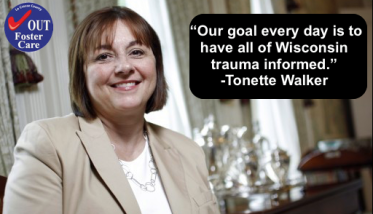
Share On Social!
An initiative by the First Lady of Wisconsin to prevent and reduce childhood trauma has grown to become a dynamic collaboration, putting Wisconsin in the lead to be the first trauma-informed state.
Trauma during childhood negatively affects development and physical and mental health into adolescence and adulthood.
Traumatic events include: physical and emotional neglect; physical, emotional and sexual abuse; parental divorce, separation, incarceration, and substance abuse; and poverty. These are also called adverse childhood experiences (ACEs) and were first studied in the 1990s.
The more ACEs a child experiences, the higher their risk of chronic disease, mental illness, substance abuse, violence, teen pregnancy, incarceration, and dropping out of high school.
Since the initial study, racism, losing a parent to deportation, being an immigrant, moving many times, witnessing family or caregiver being abused, and involvement in the foster care system have been included.
Trauma impairs early development for Latino and all kids. These young children start kindergarten behind their peers and don’t catch up.
The Latino population is growing is Wisconsin. This population has increased by 46.8% since the 2000 census.
Fostering Futures
In keeping with the “First Ladies and Their Causes” tradition, Wisconsin’ new First Lady, Tonette Walker, needed to determine a cause and subsequent initiative to lead.
She was passionate about the needs of Wisconsin’s children, particularly foster children, but hadn’t decideded.
Then she was introduced the science of ACEs through Lauri Gramling Lambach, president and CEO of SET (serve, empower, transform) Ministry, and Dr. Angela Carron, a pediatrician and executive director of the Fostering Hope Foundation.
In 2010, Wisconsin had just completed its first ACEs survey and found that 58% of Wisconsin adults have at least one ACE and 14% have four or more.
“Just seeing the brain science of ACEs was all new to me,” said Walker, according to Jane Ellen Stevens, founder and publisher of the ACEs Connection Network. “When I heard about it for the first time, I thought: Is this true? Is this right? Could this be why children have problems in school, why adults can’t hold jobs, why some people are stuck in the cycle of welfare their entire lives? It’s trite to say, but the light bulb went on….it was just at that moment.”
In April 2011, Walker founded Fostering Futures with Labmbach and Carron.
They wanted to raise awareness about how childhood trauma can dramatically shape a person’s life and influence policy to advance trauma-informed care.
Trauma-informed care can help prevent ACEs among Latinos and help overcome them should they occur.
In the first phase of the initiative, they selected three pilot communities—urban, rural, and trial—to inform about ACEs science and to support in developing and integrating trauma-informed practices. The three communities were: one urban (Milwaukee’s Harambee neighborhood), one rural (Douglas County), and one tribal community, the Menominee Nation.
The team learned a lot during the first phase, particularly that the science of ACEs is a nonpartisan issue.
 Meanwhile, the Wisconsin Department of Children and Families (WDCF) set up the Wisconsin Trauma Project, to provide trauma-informed training for parents, caregivers, mental health clinicians, and county and tribal systems. Forty-three counties and three tribes have participated.
Meanwhile, the Wisconsin Department of Children and Families (WDCF) set up the Wisconsin Trauma Project, to provide trauma-informed training for parents, caregivers, mental health clinicians, and county and tribal systems. Forty-three counties and three tribes have participated.
Wisconsin did three more ACEs surveys in 2011, 2012, and 2013.
They found that ACEs are common and they co-occur, particularly among low-income individuals, unemployed individuals, uninsured individuals, and individuals without a high school diploma.
Making Wisconsin the First Trauma-Informed State
In January 2016, First Lady Walker addressed the governor’s Cabinet to personally deliver an invitation to state agencies to join a two-year Fostering Futures learning collaborative.
Then, Governor Walker directed seven state agencies to accept the invitation to learn more about ACEs and implement trauma-informed principles into work environments.
They couple wants to make Wisconsin the first trauma-informed state in the U.S.
In April 2016, 60 people from the seven agencies sat down to learn about ACEs science and how they could use it to build a trauma-informed workforce and heard that they were joining a two-year trauma-informed learning community, according to Stevens. The agencies included: Department of Health Services Division of Public Health, the Department of Health Services Children’s Long-Term Supports, the Wisconsin Economic Development Corporation, the Department of Corrections, the Department of Children and Families, the Department of Veterans Affairs, and the Department of Workforce Development.
“Many of these people were hearing this ACEs and trauma information for the first time,” said Lambach, according to Stevens. “They were able to connect dots more deeply and more quickly than we had hoped.”
You can read stories of four state agencies experiences implementing trauma-informed practices here.
Moving Towards a Trauma-Informed Nation
In June 2017, Walker met with Secretary of Health and Human ServicesTom Price, Department of Labor Secretary Alex Acosta, Housing and Urban Development Secretary Ben Carson, Department of Education Secretary Betsy DeVos, and with staff at the Department of Justice.
She connected the need for trauma-informed care to reduce and prevent opioids, obesity and serious mental illness, which were Secretary Price’s health priorities. She also advocated for a federal learning collaborative, similar to StopBullying.gov, and a national trauma awareness day.
Walker’s efforts led to the introduction of a bipartisan resolution,“Recognizing the importance and effectiveness of trauma-informed care” in the House (H. Res. 443) by Mike Gallagher (R-WI) and Danny K. David (D-IL) and in the Senate (S. Res. 346) by Ron Johnson (R-WI), Heidi Heitkamp (D-ND), John Boozman(R-AR), and Tammy Baldwin (D-WI). Trauma-informed care takes into account a patient’s history of trauma in the design of the patient’s treatment.
In September 2017, Walker organized the first Trauma-Informed Care First Spouses conference and spouses from 11 states attended—democrats, independents and republicans.
“We’re not asking them to do what we’re doing, necessarily,” Walker said according to Stevens. “We’re just asking them to embed ACEs science and trauma-informed care into their work.”
Find out if any agencies or organizations implement trauma-informed practices in your state and ask how you can support the trauma-informed movement.
By The Numbers
28
percent
of Latino kids suffer four or more adverse childhood experiences (ACES).



